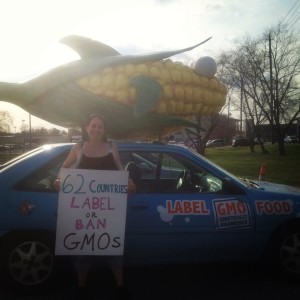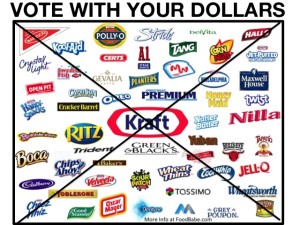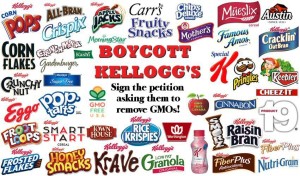
I created my sign to highlight the laws in other countries because many people think that this is a fringe movement, not realizing that more than 60 other countries consider GMOs potentially dangerous to our health and environment, and necessary to regulate and restrict.
I had an awesome time taking part in the Eat-in at the FDA on Monday, a picnic-style protest for the labeling of genetically-engineered (GMO) foods, and clearly I’m still fired up.
One topic I asked a few people about during the event was which companies they thought may be ripe to write or call personally to right now to provoke action. One woman immediately answered, “Any!” and said she’d learned that companies will respond if only 5% of their consumers reach out to them. Protests and petitions do a lot of good, but companies realize that many of the participants already were not their consumers. However, when consumers call or write an old-fashioned letter to speak up, companies start to pay attention. McDonald’s and other fast food chains even quietly stopped using GMO potatoes after consumers complained.
Writing to companies directly as a consumer is the easiest and most effective way that anyone can participate in changing the food industry, and ultimately the health of our nation. Participating in a protest is mainly a public service, to educate and raise awareness because, for example, people must know and care what a GMO is in order for change to occur. Hopefully soon a state will pass a bill to label genetically-engineered foods, but it may not be perfect. For instance, beef labeled “grass-fed” may not only be fed grass, or may still be raised in inhumane conditions, or given excessive antibiotics. Food may be labeled “Made With Organic Ingredients” with 70% organic ingredients, and “USDA Organic” with 95 percent. Currently there’s motion to change the definition of milk so aspartame can be added into flavored milk without label on the front, and it’s indisputable it was a mistake for the FDA to approve aspartame in the first place.
This leaves it up to us to tell food companies what we want, and to urge them to make responsible choices and not wait for government regulations to tell them what they are able to get away with. There are many problems with the food in this country beside the use of GMO ingredients, you really just have to read any packaged food label to find one.
You can make a huge impact by doing one quick, simple thing. Look at any food you may buy or have already stopped buying after learning the ingredients and call or write the company and let them know:
“I had a question: Do you use genetically modified ingredients? I’m sorry to hear that. I’m putting your product back on the shelf and am going to find a replacement product for my family.”
“I just learned that you use yellow #5 and yellow #6 in your food. These chemicals are derived from petroleum and linked to hyperactivity, food allergies, asthma, and migraines, and require warning labels in other countries. I will no longer buy your product until you reformulate your recipe.”
“I understand these substances are approved in the U.S., but more research shows that they have health hazards than that they are safe, and they do not belong in food, especially those marketed to children.”
“I just learned that the way your livestock are treated with antibiotics is dangerous and leading to antibiotic-resistant strains of bacteria. I will buy lunch meats from another producer until you change your farming practices.”
Here are some companies whose products you may want to consider removing from your pantry and their contact information. Please take a moment to contact at least one of them (or one per day, or per week) and ask at least one friend to do the same. It takes hardly any time, and can make a huge difference.
1. Girl Scout Cookies
I recently tasted a Mango Creme, and it had such a chemical taste it was unbelievable. They use genetically-engineered soy, corn and sugar from sugar beets, and artificial food dyes. Ask the organization to reformulate its cookies without GMOs, and without toxic ingredients like high-fructose corn syrup, hydrogenated oils, processed soy, and unnecessary food dyes. The Girl Scouts have a reputation as a fairly progressive organization and do so much to benefit girls, so I imagined they would be pretty receptive to consumer outcry. I learned that after the longtime efforts of two Michigan girls, they finally did pledge to find a source of palm oil that doesn’t devastate the rainforest. More recently, the petition below has already put a little spotlight on them for their use genetically-engineered ingredients, so I think it’s a great time to contact them personally. On their website, they say that they concern themselves with issues affecting young girls, including health, body image, politics and activism, yet they use ingredients that destroy the environment, oppress farmers, and are linked to a slew of health issues, especially those concerning children including hyperactivity, learning disorders, asthma and food allergies. Reformulating their recipe would be a huge opportunity to help young girls, make their recipe healthier, use as an education opportunity, and solidify their reputation.
Make a quick call or write a short note to remind them that using these ingredients is in direct violation of the Girl Scout law to be caring and responsible, to use resources wisely, and to make the world a better place.
Call:
(800) GSUSA 4 U [(800) 478-7248] or (212) 852-8000
Write:
Girl Scouts of the USA
420 Fifth Avenue
New York, New York 10018-2798
E-mail: http://www.girlscouts.org/contact/email.asp
Petition: Please Make Cookies Without GMOs
Boycott the cookies and bake your own. There are other ways to support the Girl Scouts without destroying your health, such as donations and magazine subscriptions.
More info: GMO Inside: Dear Girl Scouts, We Want Non-GMO Cookies
2. Kraft/Nabisco
Vani Hari aka “Food Babe” has really hit Kraft hard for the past month for their use of artificial food dyes yellow #5 and #6 in the U.S. version of mac and cheese that are banned in the U.K. version. These dyes are carcinogens linked to asthma, allergies, migraines and hyperactivity in children and have no business being in food marketed for kids. The two versions are almost indistinguishable (in taste tests, people thought they were identical or preferred the U.K. version without dyes). They already have a reformulated product overseas, and while they have not been extremely forthright in responding to Food Babe’s petition of over 270,000 consumer signatures or answering her questions, she’s certainly shaken them. I think it’s a good time to hit them from another angle and ask Nabisco to remove artificial food dyes from their products as well, since they’re owned by Kraft. Many people choose Triscuits and Wheat Thins because they think they’re making a healthier snack choice. In fact, these crackers marketed as being health-conscious also contain MSG and genetically-engineered ingredients, and Wheat Thins contain food dyes as well.
Call Kraft: 847-646-2000
Write Kraft:
Kraft Foods Global, Inc.
Global Consumer Relations
1 Kraft Court
Glenview, IL 60025
Call Nabisco:
1-855-535-5648, 800-847-1997
Write Nabisco:
Mondelez International IncConsumer Relations
Attn: Nabisco Customer Service
100 Deforest Ave
East Hanover, NJ 07936
More info:
Inside Story of Food Babe’s Visit and Petition Delivery to Kraft Foods
100 Days of Real Food: How to Find and Avoid Artificial Food Dyes
3. Kellogg’s
Diana Reeves from Connecticut has started a growing movement to boycott Kellogg’s products. Kellogg contributed $790,700 to pay for media propaganda against Prop. 37 which would have required the labeling genetically-engineered foods in California. The corn they use in Corn Flakes, Nutri-Grain Bars, and other products is modified to produce pesticides that cause the stomach lining of insects to explode. They have already agreed to make their Kashi products GMO-free by the end of 2014. Please call or write them and ask them to remove GMO’s from all of their products by 2014.
Call:
1-800-962-1413
Write:
Kellogg’s Consumer Affairs
P.O. Box CAMB
Battle Creek, MI 49016
E-mail:http://www.kelloggs.com/en_US/contact-us.html
Petition: Kellogg Remove GMOs From Your Products
Finally, probably the most effective and easiest place to initiate change is in your local grocery store. You can call or write to ask the company if they plan to join with thousands of other stores in rejecting genetically-modified salmon, or if they know about Whole Foods’ pledge to require genetically-engineered foods to be labelled in their stores by 2018, and if they would consider doing the same, at the very least on the products included in their “health food” section.




